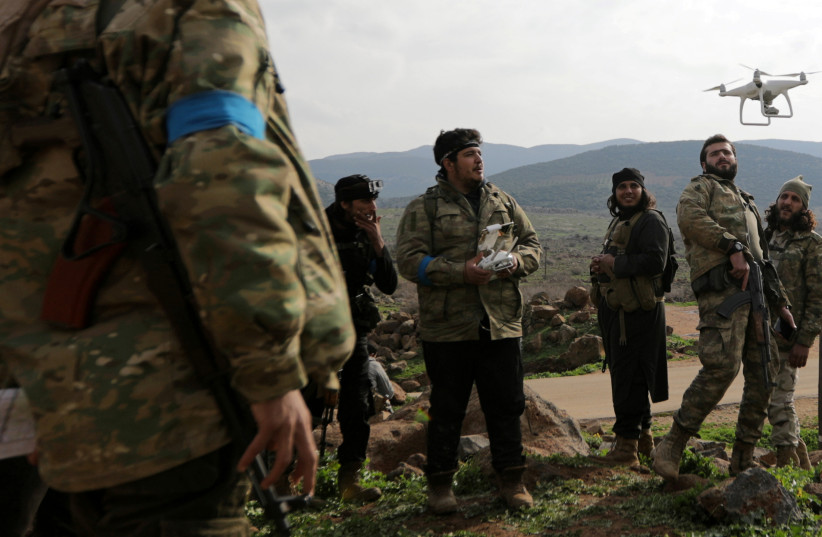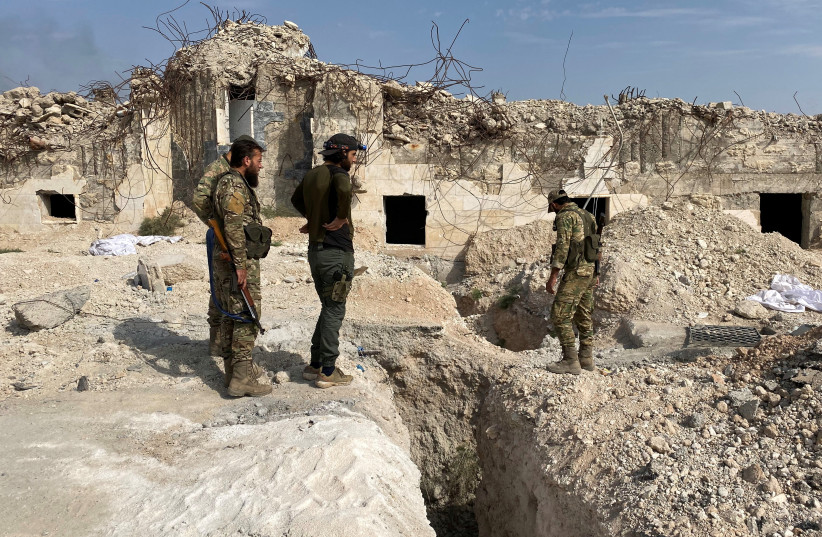On Thursday, a Turkish drone struck a group of teenage girls playing volleyball.

Turkey used a drone to conduct an illegal extrajudicial killing of four civilians in Syria, according to reports. Turkey has increased its use of drones to carry out assassinations in Syria, often targeting what it claims are “terrorists.” Over the years Turkey and pro-Turkey extremists in Syria have often targeted women activists such as Hevrin Khalaf, the head of the Future Party, and also members of the US-backed Syrian Democratic Forces. A Turkish artillery bombardment also killed a dozen tourists in Iraq in July. The attacks come in the context of increased meetings between Turkey and Russia and Moscow and Tehran, in which Ankara seeks to launch a new military operation in Syria against Kurds and other minorities.
According to a report at Rudaw, a media channel in the Kurdistan region of Iraq, “a suspected Turkish drone targeted a girls’ education center in Hasaka province, northeast Syria (Rojava) on Friday, killing four children and injuring 11 other people, the Kurdish administration said later in the day.” The report notes that “the Autonomous Administration of North and East Syria (NES) said in a statement on Friday that the region has seen a ‘new escalation of a systematic aggression’ by Turkish forces.” US forces in Syria also commented on the strike. “On the evening of Aug. 18, an armed unmanned aerial system struck a group of teenaged girls playing volleyball who were active in a United Nations educational outreach program in Hasakah. Initial reports indicate that the strike killed four and wounded several others. On behalf of CJTF-OIR, I condemn this attack and any others that kill and injure civilians,” a statement by the US Combined Joint Task Force, operating to defeat ISIS, noted on Friday.
North Press Agency also reported that the identities of the four child victims of the drone strike have been made public. The report says that the “Turkish attack targeted a United Nations educational center two days ago.” Turkey often operates drones in Syria, and it appears to be able to operate them freely and carry out attacks because Russia and the US do not interfere. Russia and the US both operate air force assets in Syria. The Syrian regime also has a relatively weak air force. It appears that at the behest of Iran, due to Iran and Russian agreements with Turkey, Turkey can attack with impunity in Syria as long as the targets are Kurds or minority groups in eastern Syria. The US views Turkey as a “NATO ally” and does not appear to prevent the drone attacks since the US withdrew from some border areas in Syria in 2019 due to the Trump administration’s close relations with Turkey.
This complex management of the air in Syria has resulted in a vacuum and open season on Kurdish activists, particularly women and children. For instance, NBC reported in late July that a well-known Kurdish female commander had been killed in a Turkish drone strike. “Salwa Yusuk, of the US-backed Syrian Democratic Forces, gained a reputation for her courage on the battlefield in the fight against ISIS.” The report noted that “a renowned female commander of the Kurdish opposition forces in Syria, credited by the US military with saving American lives in the battle against ISIS, has been killed by a Turkish drone strike, according to two defense officials.”
It appears Kurds are being targeted and killed at least in part because Ankara is killing them to get back at the US for its role in Syria. Since the Syrian war began Turkey has sought to back extremists in Syria, primarily far-right Islamist groups. Most ISIS supporters, for instance, transited Turkey to get to Syria and Iraq. After 2016 as ISIS was being defeated and the myriad of Syrian rebel groups was being pushed back by the Russian-backed Syrian regime; Turkey transitioned to turn Syrian rebel groups into proxies. These proxies included extremists, such as Ahrar al-Sharqiya. That group was one of many Turkey sought to use to fight the Kurdish YPG in 218 and 2019. The YPG is part of the Syrian Democratic Forces (SDF), the US-backed group of Kurds and Arab fighters who defeated ISIS in 2017. Turkey describes the SDF as “terrorists.” Because Ankara is wary of attacking US troops, it kills members of the SDF instead. The US backs the SDF but won’t supply air cover for the SDF and when Turkey demanded areas of Syria from the SDF, the US withdrew from cities along the border in 2019.

Turkey’s brutal campaign against minorities in Syria
This has left the Kurds and other members of the SDF, as well as Christian communities in places like Tel Tamr, exposed to endless attacks by Turkey and groups backed by Ankara. For instance, after Ankara invaded the Kurdish region of Afrin in 2018 it ethnically cleansed the area of Kurds and in 2021 began to demand to attack Tel Rifat where the Kurdish refugees had fled. Turkey also bombs the Kurdish refugee camp of Makhmour in Iraq, and carries out airstrikes on Yazidis in northern Iraq, always under the guise of “fighting terrorists.” Ankara has perfected this “war on terror” line dating from the early 2000s when the US began a war on terror. Ankara has also sought to prevent Sweden and Finland from joining NATO, claiming that they host “terrorists.”
US forces appear to be raising the alarm about the attacks in Syria which are targeting their partners. On August 19 the Combined Jointed Task Force, Operation Inherent Resolve, the US Central Command forces supporting the war against ISIS, issued a statement about the attack on the civilians. The statement does not mention Turkey but it does say that teenage girls were killed by a drone. “Such acts are contrary to the laws of armed conflict, which require the protection of civilians. We extend our condolences to the families of those killed and sympathies to those injured….The increase in military hostilities in northern Syria is creating chaos in a fragile region where the threat of ISIS remains present. We call for immediate de-escalation from all parties and an end to activities that put at risk the significant battlefield gains the Coalition has made against ISIS,” the statement says.
The names of the four women and girls murdered in the drone strike are said to be Ania Atta, Zozan Zeidan, Dylan Ezz El-Din and Diana Alo. They were born between 2002 and 2004. North Press noted that “eyewitnesses reported at the time that ambulances transported many of the injured to hospitals in al-Hasakah.” The report says the strike was some 30-50km from the Turkish border. That Ankara carried out a drone strike so deep in Syria, near areas US forces operate, shows that it feels it has impunity to use drones to kill civilians wherever it wants. In the past, human rights groups have condemned the use of drones in extrajudicial killings. For instance, in 2002 Al-Jazeera ran a report about UN rapporteur Agnes Callamard discussing armed drones, and “the illegality of [IRGC commander Qasem] Soleimani’s killing, and the myth of ‘surgical strikes’” However, Callamard is now Amnesty International’s Secretary General and it is unclear if human rights groups will focus on Ankara’s use of drones to carry out assassinations and killings. While human rights groups have focused on Israel and the US in relation to the use of drones, it appears Turkey is not a focus.
According to the North Press report, the latest drone attack in Syria occurred just a few kilometers from one of “the largest bases of the international coalition to combat the Islamic State (ISIS), which includes radar systems and American officers, and helicopters usually take off from the American base, as the residents call it.”
The attack has also been condemned by the Autonomous Administration authorities in eastern Syria. “Today, the fascist Turkish state carried out a drone attack against a road between Tal Tamir and Hasaka, targeting a special education center for girls which is supervised by the United Nations in the village of Shamuka, which is no more than two kilometers away from a base of the global coalition. The attack resulted in the death of four children and the wounding of 11 people – all of them girls,” read the statement.
On Friday Iranian media reported on Turkey’s latest claims to be fighting “terrorists” in Syria.
“Turkish President Recep Tayyip Erdogan says that the United States continues to support terrorism inside Syria and Iraq, blaming the insecurity faced by the Arab nations on the United States and its allies while claiming that Ankara is fighting terrorists in Syria,” Iran’s Press TV noted. While “Speaking to reporters on Thursday following a one-day working visit to Ukraine, Erdogan said it is Washington and its allied forces that ‘primarily feed terrorism’ in Syria,” the report said. Turkey claimed the US “lies behind” unrest in Iraq.
The statements by Turkey do not appear to be a coincidence. It uses drones to attack civilians near US forces in Syria to show that Syrians are not safe and that no one will protect them. Ankara appears to have sway over the UN and human rights groups to prevent any investigations of these attacks. The UN investigated the US use of drones and human rights groups also focused on drone strikes up until Ankara began conducting the strikes. Turkey has recently sought to leverage ties with Ukraine and new diplomatic relations with Israel as cover for its Syria policy; even as it works with Russia and Iran to push for a greater role in Syria. The four civilians killed in Syria, as well as the tourists massacred in Iraq in July, appear to be Ankara’s way of showing it can do as it wants in Syria and Iraq.
As reported by The Jerusalem Post
